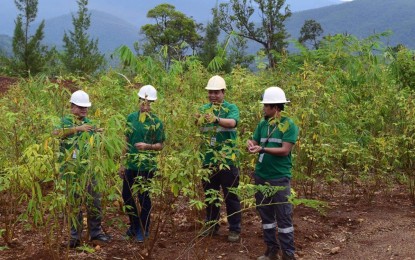
TREE PLANTING. Philippine Nickel Industry Association (PNIA) member companies intensify their progressive rehabilitation efforts as part of its environmental protection and enhancement programs (EPEP). As of August 2020, PNIA has planted over 6.59 million trees in communities where the mining companies operate. (Photo courtesy of PNIA)
MANILA – The Philippine Nickel Industry Association (PNIA) reported Wednesday that its member companies have planted 6.59 million trees covering 3,167 hectares of land as of August 2020 as part of its environmental protection and enhancement programs (EPEP).
In a virtual press conference, PNIA president Dante Bravo said there was an increase of 13.9 percent in the number of trees planted by the industry group since 2019.
In the first eight months of the year alone, Bravo said PNIA members planted an additional 809,656 trees covering 322 hectares of land particularly in Surigao del Norte, Surigao del Sur, Agusan del Norte, Zambales, and Palawan where industry group members are operating.
“In our perspective, implementing our EPEPs is one of our ways to show the community how we value their land, waters, and environment. We make it a point to improve what is already in the area and contribute to the beauty, safety, and preservation of the community,” he said.
Bravo said that from January to August this year, PNIA members invested over PHP202 million in their various progressive rehabilitation efforts.
“Our members do not just plant for the sake of planting just to meet the requirements of the government. We conduct research to identify which tree species will be most beneficial for the specific environment of each mine site,” he added.
Over 70 species of trees were planted by PNIA including narra, agoho, molave, rubber, palawan cherry, golden shower, and maribuhok as well as fruit-bearing trees like coconut, rambutan, cashew, jackfruit, cacao, pineapple, coffee, and calamansi.
Aside from the EPEP, the mining industry initiated bamboo planting even before the Department of Environment and Natural Resources mandated this last June.
“Between January to August 2020, our members have planted 23,000 seedlings, bringing their total to over 46,000 bamboo seedlings planted over nearly 100 hectares,” Bravo said.
He said the industry has also rolled out livelihood classes in communities to maximize the use of bamboo and harness economic benefits from bamboo farming.
“PNIA members endeavored to sustain, if not enhance our environmental programs, ensuring we always go beyond what is mandated by the government and making sure that these programs are inclusive and beneficial for the local communities. We remain steadfast in our dedication to environmental rehabilitation and enhancement programs, even during the pandemic, and will continue with rehabilitating as we operate” he added. (PNA)
